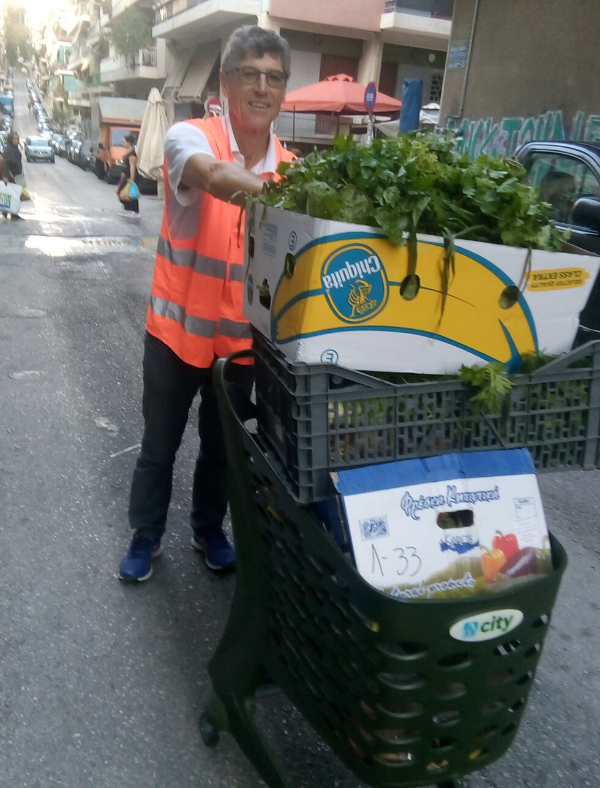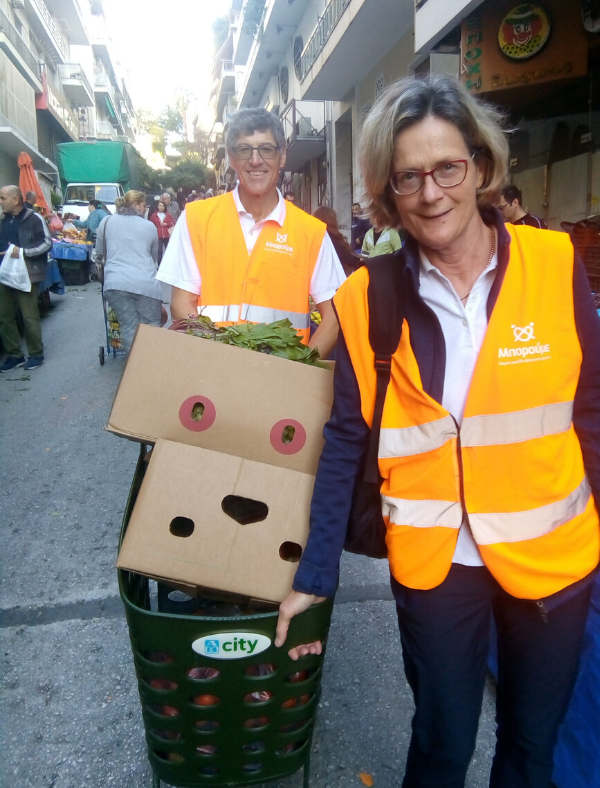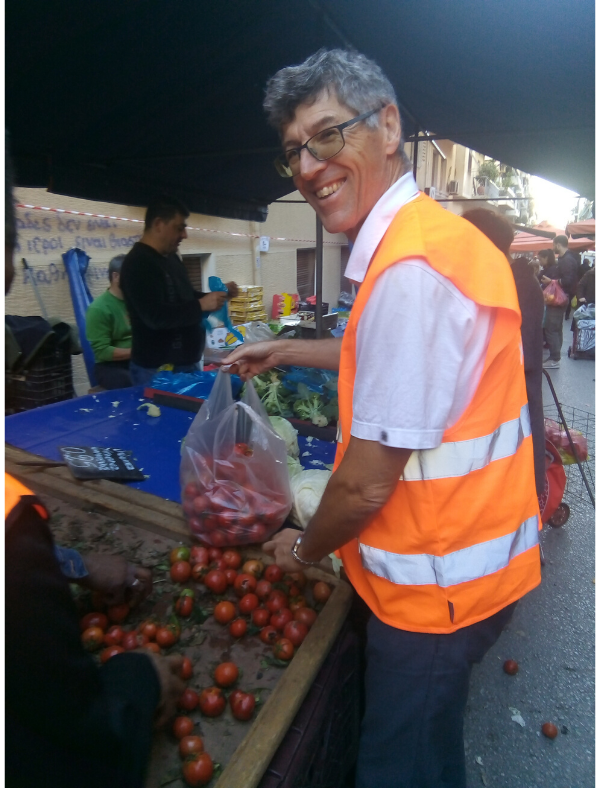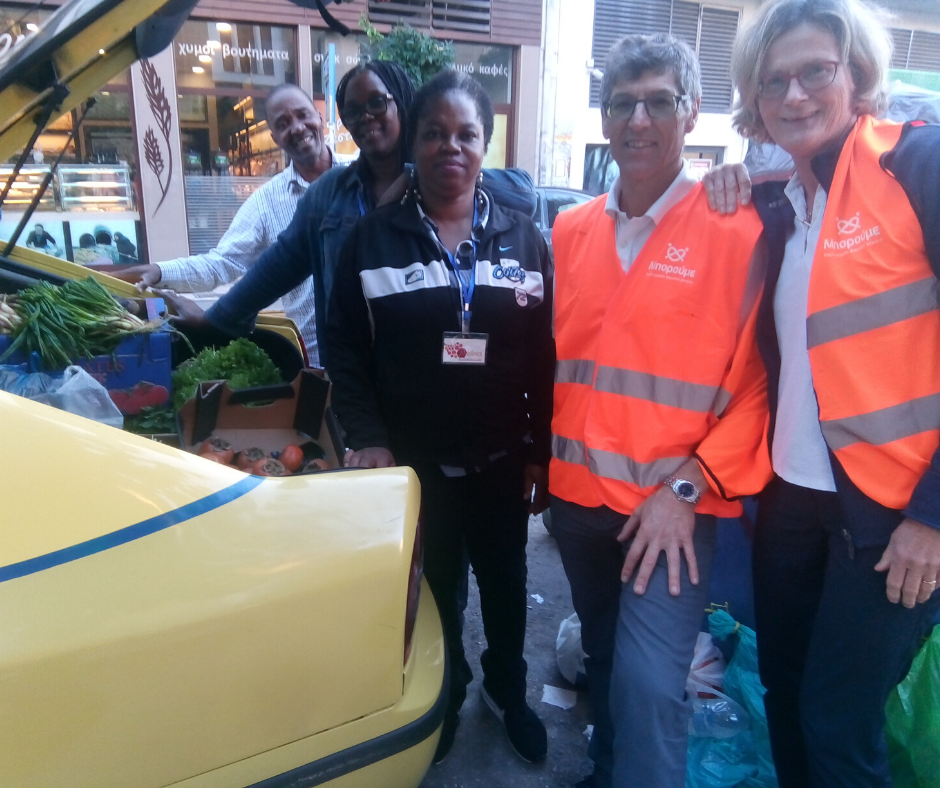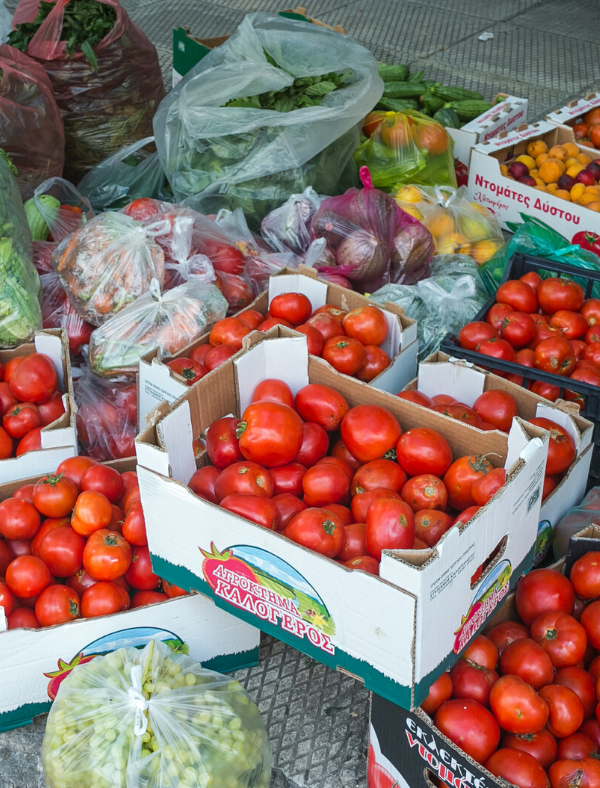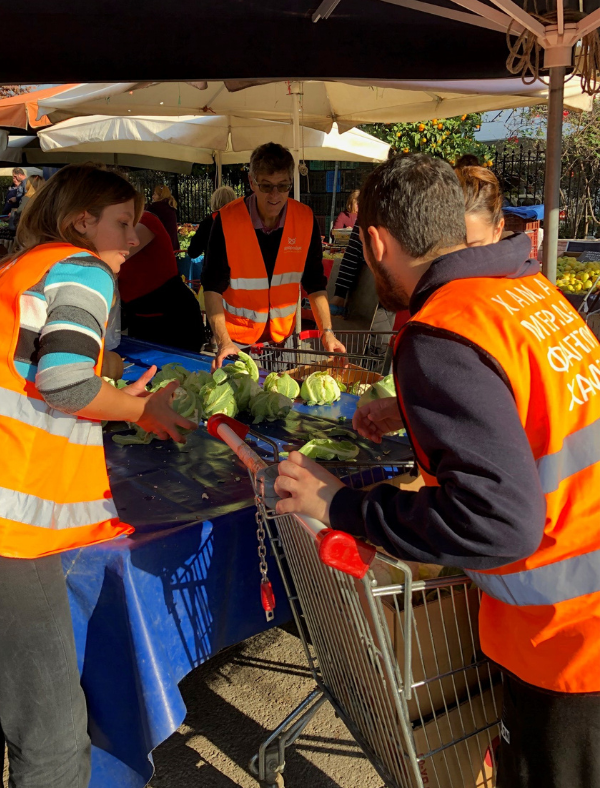Volunteer Story
July 13, 2020
For Perth barrister Leo Tsaknis, volunteering with Boroume at the farmers’ markets was a highlight of his stay in Athens last year.
Every year for the past six years I had made the trip to Greece from Perth, Western Australia, with my wife, Anne Marie, and one or more of my three children. Athens was always the first stop, to recover from jetlag, see the well-trodden sites and to visit relatives before travelling to one or more of the islands.
However this trip was going to be different. It was only Anne Marie and I, and there would be no trip to the islands. We would spend an entire month in Athens and immerse ourselves in all the city had to offer.
We landed in Athens in mid-November 2019 on an uncharacteristically warm afternoon. After making our way on the metro to our apartment in Pangrati – and a good night sleep – it was time to look through my notes and guidebooks and decide what to see and where to eat during our stay. Before I left Australia, I had told my friend, Nick, about my plans and he had sent me an e-mail with some suggestions. It had the usual historical sites, parks, arts and crafts galleries and restaurants but at the end was a note, “in case I was up for some volunteering,” with a link to charities he and his wife, Theona, supported through The Hellenic Initiative Australia.
Boroume (literally “we can”) has a mission to reduce food waste and to fight malnutrition in Greece. It adopts a holistic approach, increasing awareness about food waste, implementing programs to reduce food waste, informing potential food donors about its food saving mechanisms and providing nutritional support in a transparent and dignified way to families in great need. While I was aware of the country’s struggles, for me food was as central to Greece as the Parthenon and its philosophers and significant malnutrition was not something I associated with present day Greece.
I clicked on the link inviting volunteers to participate in the Boroume Farmers’ Market Program and filled in the form. The next day, I received an e-mail from Anna from Boroume, asking if I would like to join a team of volunteers at one of four nominated markets at around closing time at 2.30pm, for about an hour and a half. I told her I could make it, and that Anne Marie would join me, too.
Two days later Anna emailed instructions to meet the following afternoon outside the AB City supermarket in Gkyzi, near Ambelokipi metro station, a couple of streets away from the weekly farmers’ market. Arriving shortly before the appointed time, I was hoping that we were not there merely to “make up the numbers”. As things turned out, I needn’t have worried. An effervescent woman bounced up to us extending a friendly hand. “You must be Leo,” Anna said. That we were so instantly recognisable was slightly concerning. What made us stand out? Were we overdressed, or something else? Would we be welcome amongst the no-nonsense stallholders?
Anna introduced us to Christina and Vicki, chefs and volunteers from the local municipal soup kitchen, who would later create meals with the produce we collected. Anna explained that the local supermarket loaned Boroume two shopping trolleys, which we would use to collect whatever remaining fruit and vegetables the stallholders were willing to give us. We would return to that spot with the produce, which would be collected by a local taxi driver free of charge and delivered to the municipal soup kitchen.
Anna handed us a high-vis Boroume vest. Anne Marie was appointed to wait there and watch over the food we collected until it was picked up. A few moments later Michael, a university student, joined us. He took one trolley and I took the other and down the hill to the market we went.
Anna led the way. She chatted, cajoled and at times shamelessly flirted with each stallholder as if they were old friends. Then she would point to a stall. The first time that happened I didn’t know what to do, then I realised her pointing was my cue. I would approach the stallholder for confirmation as to what I could take. Invariably, it was “the lot,” whether that was 10 kg of tomatoes, 20 lettuces or two boxes of cucumbers. My trolley filled up quickly. I turned to go back to unload, only to be stopped by a stallholder offering a box of eggplants. I managed to fit it in my already overflowing trolley, which was becoming increasingly difficult to steer under the weight of the produce.
Nearly at the end, a stallholder offered me a box of onions. I looked at the trolley and shrugged. “I have no room,” I said to him in Greek, contemplating what to do. Anna materialised seemingly from nowhere, smiling broadly at the stallholder then turning to me with a look that said we must find a way. “If it’s offered we must take it,” Anna said. “There is nothing more insulting than offering your help and being rejected. If we reject something that stallholder may never offer us anything again. Worse, a rejection will spread throughout the market.” I made a mental note to add psychology to Anna’s formidable communication and organisational skills. Momentarily I thought that her skills were being wasted, that she should be the CEO of some powerful organisation, but then I thought, what could be more important than this?
I left the contents of my trolley with Anne Marie and retraced my steps. I was stopped by the stallholder who moments earlier had given me the cucumbers. “Where are you from?” he asked. When I told him I was from Australia, he looked at me with a mixture of astonishment and gratitude. “You have come from so far away just to collect some food for our poor people,” he said. But I was not a stranger, I may have been born and raised in Australia but both my parents were born Greek. I am Greek.”
I introduced myself and asked him if this was his only market. His name was George and he said he lived on a farm outside Corinth with his wife and two young children. Every morning, except Sunday, he would wake up at 3am, load his truck with the produce that his wife had harvested during the previous day and drive to a different market in Athens, arriving at 6am to set up. He returned home between 8-9pm.
I shook my head in disbelief. The stallholders and the hungry they gave to were almost equally poor. George told me that after his costs, he often made only 20 or 30 Euros for his day’s work, on a bad day, he lost money (with a quick mental calculation I realised he had given me the equivalent of a quarter of his day’s profits). A bad week’s trading was all that stood between him and the soup kitchen. I am sure the stallholders understood this instinctively. It was the poor giving to the very poor. I thanked George. “Tipota” (nothing), he replied, and we shook hands. He was wrong.
*My sincere thanks to Nick Mitaros for his email.
Leo and Ann Marie Tsaknis helped Boroume collect 87.5 kg of produce at the Gkyzi Farmers’ Market on 27 November 2019, which was donated to the charity “Melissa”. On 3 December 2019, they volunteered at the Halandri Farmers Market, which donated 268 kg of fruit and vegetables to the Municipal Soup Kitchen of Halandri.
